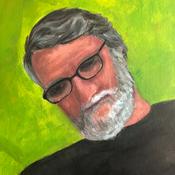Bhagavad Gita - Swami Sarvapriyananda
Vedanta Society of New York - Archives

Nieuwste aflevering
170 afleveringen
- Swami Sarvapriyananda teaches verses 26-27 from the fourteenth chapter of the Bhagavad Gita. This series of talks by Swami Sarvapriyananda on the Bhagavad Gita, 'the Song of God,' unfolds the highest truths of Vedanta.
Chapter 14 is devoted to understanding the Gunatreya Vibhaga Yoga, or the three qualities/components (gunas) of Maya. Swami Sarvapriyananda explains that, other than the Atma, everything in nature is the play of the three gunas. This insight, and transcending the play of the three gunas, is the doorway to infinity.
________________
Chapter 14, verse 26
मां च योऽव्यभिचारेण भक्तियोगेन सेवते |
स गुणान्समतीत्यैतान्ब्रह्मभूयाय कल्पते || 26||
māṁ cha yo ’vyabhichāreṇa bhakti-yogena sevate
sa guṇān samatītyaitān brahma-bhūyāya kalpate
⧫ He who serves me alone through the unswerving yoga of devotion transcends the three gunas and becomes fit for the state of Brahman.
Chapter 14, verse 27
ब्रह्मणो हि प्रतिष्ठाहममृतस्याव्ययस्य च |
शाश्वतस्य च धर्मस्य सुखस्यैकान्तिकस्य च || 27||
brahmaṇo hi pratiṣhṭhāham amṛitasyāvyayasya cha
śhāśhvatasya cha dharmasya sukhasyaikāntikasya cha
⧫ For I am the embodiment of Brahman of immutable immortality, of the eternal religion, and absolute bliss - Swami Sarvapriyananda teaches verses 23-25 from the fourteenth chapter of the Bhagavad Gita. This series of talks by Swami Sarvapriyananda on the Bhagavad Gita, 'the Song of God,' unfolds the highest truths of Vedanta.
Chapter 14 is devoted to understanding the Gunatreya Vibhaga Yoga, or the three qualities/components (gunas) of Maya.
Swami Sarvapriyananda explains that other than the Atma, everything in nature is the play of the three gunas. This insight and transcending the play of the three gunas is the doorway to infinity.
__________
Chapter 14, verse 23
उदासीनवदासीनो गुणैर्यो न विचाल्यते |
गुणा वर्तन्त इत्येवं योऽवतिष्ठति नेङ्गते || 23||
udāsīna-vad āsīno guṇair yo na vichālyate
guṇā vartanta ity evaṁ yo ’vatiṣhṭhati neṅgate
⧫ He who rests like one indifferent and is not disturbed by the gunas, who realizes that the gunas alone function is steady and does not waver.
Chapter 14, verse 24
समदु:खसुख: स्वस्थ: समलोष्टाश्मकाञ्चन: |
तुल्यप्रियाप्रियो धीरस्तुल्यनिन्दात्मसंस्तुति: || 24||
sama-duḥkha-sukhaḥ sva-sthaḥ sama-loṣhṭāśhma-kāñchanaḥ
tulya-priyāpriyo dhīras tulya-nindātma-sanstutiḥ
⧫ Alike in pleasure and pain, self-abiding regarding a clod of earth, a stone, and gold as of equal worth, calm and the same toward agreeable and disagreeable objects, and the same to praise and blame bestowed on him.
Chapter 14, verse 25
मानापमानयोस्तुल्यस्तुल्यो मित्रारिपक्षयो: |
सर्वारम्भपरित्यागी गुणातीत: स उच्यते || 25||
mānāpamānayos tulyas tulyo mitrāri-pakṣhayoḥ
sarvārambha-parityāgī guṇātītaḥ sa uchyate
⧫ The same in honor and dishonor, the same toward friend and foe, habituated to renounce all actions, such a person is said to have transcended the three gunas. - Taught by Swami Sarvapriyananda, this episode is part of a series of talks that unfold the highest truths of Vedanta through the study of the Bhagavad Gita, "The Song of God".
Chapter 14 is devoted to an understanding of the Gunatreya Vibhaga Yoga, or the three qualities/components of Maya. The entire universe is created by a projection of the three gunas - satva, rajas, and tamas. Understanding the science of the three gunas and how we can apply it to our lives is the focus of Chapter 14. However, Sri Krishna explains that while the three Gunas comprehensively describe human nature, transcending the three Gunas through knowledge and remaining steadfast in your true nature as Atman in this body, and in this life, is the doorway to infinity and leads to oneness with God.
In this episode, Swami Sarvapriyananda explains verses 21 and 22 of Chapter 14.
-------
Chapter 14, Verse 21
अर्जुन उवाच |
कैर्लिङ्गैस्त्रीन्गुणानेतानतीतो भवति प्रभो |
किमाचार: कथं चैतांस्त्रीन्गुणानतिवर्तते || 21||
arjuna uvācha
kair liṅgais trīn guṇān etān atīto bhavati prabho
kim āchāraḥ kathaṁ chaitāns trīn guṇān ativartate
⧫ Arjuna said, " By what characteristics, Oh Lord, is one who has transcended the three gunas known? What is his conduct? And how does he transcend these three gunas?"
Chapter 14, Verse 22
श्रीभगवानुवाच |
प्रकाशं च प्रवृत्तिं च मोहमेव च पाण्डव |
न द्वेष्टि सम्प्रवृत्तानि न निवृत्तानि काङ् क्षति || 22||
śhrī-bhagavān uvācha
prakāśhaṁ cha pravṛittiṁ cha moham eva cha pāṇḍava
na dveṣhṭi sampravṛittāni na nivṛittāni kāṅkṣhati
⧫ The Blessed Lord said, he who does not hate when the light of knowledge, activity or delusion arise, of son of Pandu, or desires them when they cease. - Taught by Swami Sarvapriyananda, this episode is part of a series of talks that unfold the highest truths of Vedanta through the study of the Bhagavad Gita, "The Song of God".
Chapter 14 is devoted to an understanding of the Gunatreya Vibhaga Yoga, or the three qualities/components of Maya. The entire universe is created by a projection of the three gunas - satva, rajas, and tamas. Understanding the science of the three gunas and how we can apply it to our lives is the focus of Chapter 14.
In this episode, Swami Sarvapriyananda explains verses 16-20 of Chapter 14.
-------------------------
Bhagavad Gita | Chapter 14, Verse 16
कर्मण: सुकृतस्याहु: सात्त्विकं निर्मलं फलम् |
रजसस्तु फलं दु:खमज्ञानं तमस: फलम् || 16||
karmaṇaḥ sukṛitasyāhuḥ sāttvikaṁ nirmalaṁ phalam
rajasas tu phalaṁ duḥkham ajñānaṁ tamasaḥ phalam
⧫ The result of righteous actions is said to be satvica and pure, the result of rajas is pain, while ignorance is the result of tamas
Bhagavad Gita | Chapter 14, Verse 17
सत्त्वात्सञ्जायते ज्ञानं रजसो लोभ एव च |
प्रमादमोहौ तमसो भवतोऽज्ञानमेव च || 17||
sattvāt sañjāyate jñānaṁ rajaso lobha eva cha
pramāda-mohau tamaso bhavato ’jñānam eva cha
⧫ From satva results knowledge, from rajas only greed, and from tamas nothing but inadvertence, delusion, and ignorance.
Bhagavad Gita | Chapter 14, Verse 18
ऊर्ध्वं गच्छन्ति सत्त्वस्था मध्ये तिष्ठन्ति राजसा: |
जघन्यगुणवृत्तिस्था अधो गच्छन्ति तामसा: || 18||
ūrdhvaṁ gachchhanti sattva-sthā madhye tiṣhṭhanti rājasāḥ
jaghanya-guṇa-vṛitti-sthā adho gachchhanti tāmasāḥ
⧫ Those who abide in satva go upward to the higher spheres, the rajasica dwell in the middle spheres, and the tamasica, dwelling in the function of the lower gunas, go down to the lowest spheres.
Bhagavad Gita | Chapter 14, Verse 19
नान्यं गुणेभ्य: कर्तारं यदा द्रष्टानुपश्यति |
गुणेभ्यश्च परं वेत्ति मद्भावं सोऽधिगच्छति || 19||
nānyaṁ guṇebhyaḥ kartāraṁ yadā draṣhṭānupaśhyati
guṇebhyaśh cha paraṁ vetti mad-bhāvaṁ so ’dhigachchhati
⧫ When the seer beholds no active agent other than the gunas and knows that which is beyond the gunas, he attains My being
Bhagavad Gita | Chapter 14, Verse 20
गुणानेतानतीत्य त्रीन्देही देहसमुद्भवान् |
जन्ममृत्युजरादु:खैर्विमुक्तोऽमृतमश्रुते || 20||
guṇān etān atītya trīn dehī deha-samudbhavān
janma-mṛityu-jarā-duḥkhair vimukto ’mṛitam aśhnute
⧫ Having transcended these three gunas, which are the cause of this body (and mind), the embodied self, bereft of birth, death, old age, and misery, attains immortality - Taught by Swami Sarvapriyananda, this episode is part of a series of talks that unfold the highest truths of Vedanta through the study of the Bhagavad Gita, "The Song of God".
Chapter 14 is devoted to an understanding of the Gunatreya Vibhaga Yoga, or the three qualities/components of Maya. The entire universe is created by a projection of the three gunas - satva, rajas, and tamas. Understanding the science of the three gunas and how we can apply it to our lives is the focus of Chapter 14.
In this episode, Swami Sarvapriyananda teaches chapter 14, verses 11-15, of the Bhagavad Gita. These verses describe what happens when one guna predominates over another. Swami Sarvapriyananda explains how we can observe this in ourselves but notes that the gunas are part of the material world and, as such, are constantly changing within us, whereas Consciousness, which is what we really are, is pure and constant.
_________
Bhagavad Gita | Chapter 14, Verse 11
सर्वद्वारेषु देहेऽस्मिन्प्रकाश उपजायते |
ज्ञानं यदा तदा विद्याद्विवृद्धं सत्त्वमित्युत || 11||
sarva-dvāreṣhu dehe ’smin prakāśha upajāyate
jñānaṁ yadā tadā vidyād vivṛiddhaṁ sattvam ity uta
⧫ When, through all the sense openings in this body, the light of knowledge radiates, then indeed one should know that satva predominates.
Bhagavad Gita | Chapter 14, Verse 12
लोभ: प्रवृत्तिरारम्भ: कर्मणामशम: स्पृहा |
रजस्येतानि जायन्ते विवृद्धे भरतर्षभ || 12||
lobhaḥ pravṛittir ārambhaḥ karmaṇām aśhamaḥ spṛihā
rajasy etāni jāyante vivṛiddhe bharatarṣhabha
⧫ Greed, activity, undertaking of works, restlessness, desire - these prevail, oh best of the Bharatas, when rajas predominates.
Bhagavad Gita | Chapter 14, Verse 13
अप्रकाशोऽप्रवृत्तिश्च प्रमादो मोह एव च |
तमस्येतानि जायन्ते विवृद्धे कुरुनन्दन || 13||
aprakāśho ’pravṛittiśh cha pramādo moha eva cha
tamasy etāni jāyante vivṛiddhe kuru-nandana
⧫ Darkness, inactivity, inadvertence, as also delusion, these prevail, oh descendant of Kurus, when tamas predominates.
Bhagavad Gita | Chapter 14, Verse 14
यदा सत्त्वे प्रवृद्धे तु प्रलयं याति देहभृत् |
तदोत्तमविदां लोकानमलान्प्रतिपद्यते || 14||
yadā sattve pravṛiddhe tu pralayaṁ yāti deha-bhṛit
tadottama-vidāṁ lokān amalān pratipadyate
⧫ If the embodied self meets with death when satva is predominant, then it attains the pure spheres of the worshippers of the highest dietes.
Bhagavad Gita | Chapter 14, Verse 15
रजसि प्रलयं गत्वा कर्मसङ्गिषु जायते |
तथा प्रलीनस्तमसि मूढयोनिषु जायते || 15||
rajasi pralayaṁ gatvā karma-saṅgiṣhu jāyate
tathā pralīnas tamasi mūḍha-yoniṣhu jāyate
⧫ If it [sentient beings] meets with death when rajas is predominant, then it is born among those who are attached to work; likewise, when it meets with death when tamas is predominant, then it is born in the wombs of irrational species.
Meer Religie en spiritualiteit podcasts
Trending Religie en spiritualiteit -podcasts
Over Bhagavad Gita - Swami Sarvapriyananda
Lectures on the Bhagavad Gita by Swami Sarvapriyananda at the Vedanta Society of New York.
Podcast websiteLuister naar Bhagavad Gita - Swami Sarvapriyananda, De Verwondering Podcast en vele andere podcasts van over de hele wereld met de radio.net-app

Ontvang de gratis radio.net app
- Zenders en podcasts om te bookmarken
- Streamen via Wi-Fi of Bluetooth
- Ondersteunt Carplay & Android Auto
- Veel andere app-functies
Ontvang de gratis radio.net app
- Zenders en podcasts om te bookmarken
- Streamen via Wi-Fi of Bluetooth
- Ondersteunt Carplay & Android Auto
- Veel andere app-functies


Bhagavad Gita - Swami Sarvapriyananda
Scan de code,
download de app,
luisteren.
download de app,
luisteren.




































